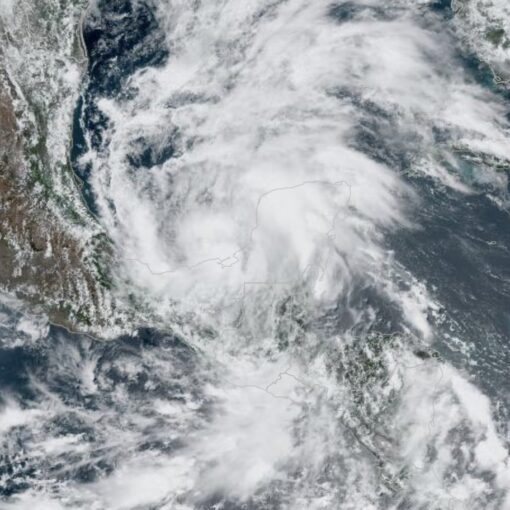Q24N (iNews) Ecuador has been plunged into chaos after gang leaders broke out of prison and gunmen stormed a live TV broadcast, forcing terrified staff to the ground.
“I am still in shock. Everything has collapsed. All I know is that it’s time to leave this country and go very far away,” said Aline Manrique, head of news for TC Television.
“They aimed the gun at my head. I thought about my entire life, about my two children.”
– Advertisement –
Ecuador’s president Daniel Noboa, who took office in November with a promise to bring stability to the country, issued a decree saying the country had entered an “internal armed conflict” after a series of violent assaults.
Once, this small nation of 17 million on the Pacific coast between Colombia and Peru was a symbol of stability but since 2018, analysts suggest it has become a “narco state” riddled with drug crime and violence.
Across the region, previously safe countries like Chile and Costa Rica are suffering the same fate, with a cocktail of drugs, guns and migration fuelling gang violence.
Read more: Is it still safe to live in or visit Costa Rica?
Cocaine has driven the change in Ecuador. When security was tightened at Colombian ports, gangs looked for easier ways to ship their illicit merchandise to Europe or Australia instead of the United States, where profits are lower.
“What is happening in Ecuador is a problem for all of South America,” Carlos Malamud, an expert on Latin America at Real Elcano Institute, a think-tank in Madrid, told i. “The drug gangs are integrating into the institutions of states across the region.
– Advertisement –

“When [then Ecuadorian president] Rafael Correa got rid of the US base in 2009 it was like an invitation to the drugs gangs.”
Six years ago, Ecuador was a sleepy Andean state that exported fish and oil. It had the fourth lowest homicide rate in South America, at 5.8 per 100,000 people.
By 2019, the country had become one of the main routes for cocaine out of the continent. Ecuadorian gangs like Los Choneros began moving cocaine for Mexican and Albanian gangs. In 2023, the murder rate rose to 35 per 100,000, higher than Mexico and Brazil.
Now, criminal gangs set off car bombs and hang dead bodies from bridges. The raid on the television station was just the latest in a string of attacks on journalists who expose them.
– Advertisement –
In August, presidential candidate Fernando Villavicencio, who was running on an anti-corruption platform, was assassinated in broad daylight. Six alleged Colombian hitmen were found hanged in their prison cells in October. Police believe they were murdered by other prisoners.
Drug gangs are fighting each other and the government for control of ports and smuggling routes.
The response of Noboa, who at 35 is the youngest head of a democracy in the world, will be crucial, observers said. “This is a turning point,” said Will Freeman, a political analyst at the Council on Foreign Relations.
“Depending on how the government responds, it will set the precedent for these kinds of incidents to continue, or it will use this as a catalyst and make some very necessary structural reforms so that the state can start to win its war against crime.”
On Monday, President Noboa had declared a national state of emergency, a measure that lets authorities suspend people’s rights and mobilise the military in places like prisons.
After the gunmen stormed the TV station, Mr Noboa issued another decree designating as terrorist groups 20 drug-trafficking gangs operating in the country, and authorising Ecuador’s military to “neutralise” them within the bounds of international humanitarian law.
There have been suggestions that Ecuador may follow the example of El Salvador, which introduced tough laws imprisoning thousands of members of the maras gangs, prompting criticism from rights groups who said this contravened basic human rights.
El Salvador president Nayib Bukele has won widespread support from the population of the tiny Central American country since implementing an aggressive crackdown on ultra-violent street gangs.
Amid concerns the crisis in Ecuador may spill across its borders, Argentina, Bolivia and Colombia expressed their support for the country.
The Ecuadorian government says at least 30 attacks have taken place since the leader of Los Choneros, Adolfo Macias – known as Fito – was discovered to be missing from his cell in a low-security prison on Sunday. He was scheduled to be transferred to a maximum-security facility that day.
Three thousand armed men have been searching for Macias, whose gang controls the prison he was held in. He was jailed for 34 years in 2011 for murder, drug trafficking and belonging to an organised crime group.
Despite his long jail term, he has retained control of his criminal empire from behind bars.
Ecuadorian officials said another gang leader, Fabricio Colon Pico, head of Los Lobos, had also escaped from prison in the town of Riobamba. He was captured on Friday and accused of trying to murder one of the nation’s lead prosecutors.
– Advertisement –
Source link
Q Costa Rica



